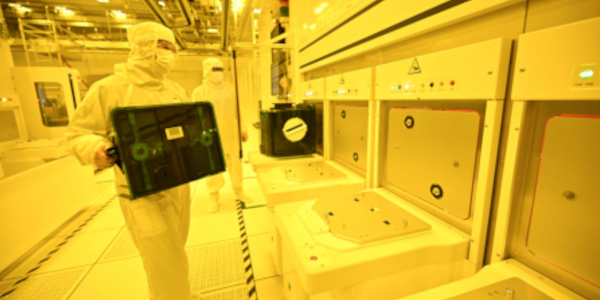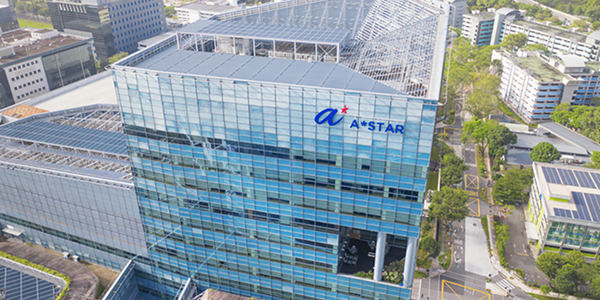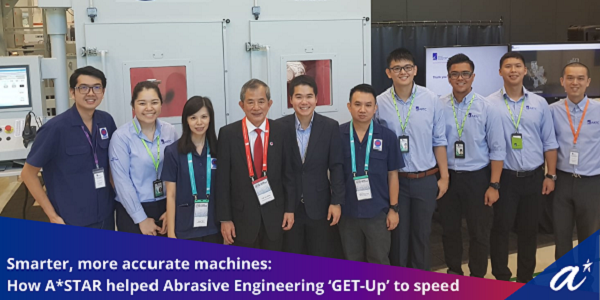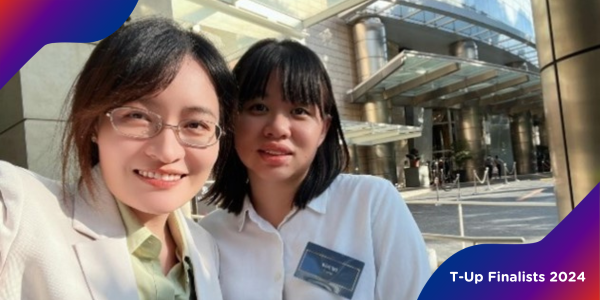INNOVATE
Tendonplus Medical: Filling the Talent Gap with T-Up
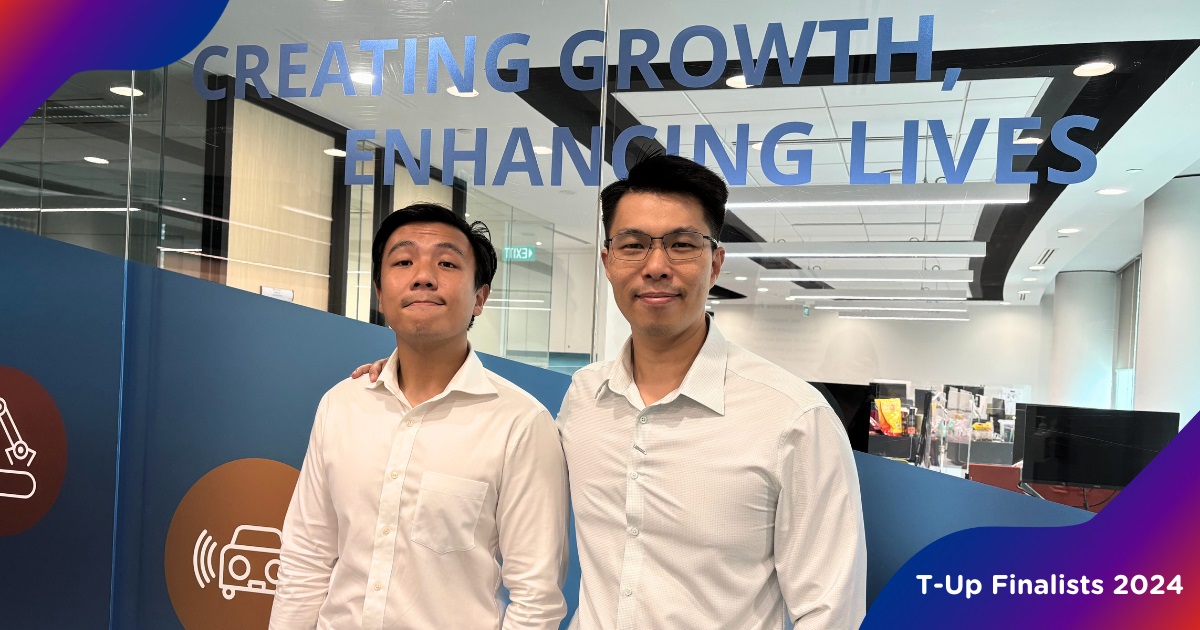
Wu Zi An (left), Senior Research Engineer at A*STAR’s SIMTech and T-Up Secondee, with Mr Ryan Kua (right), CEO of Tendonplus Medical
Tendonplus Medical develops advanced therapies to repair and regenerate damaged tendons. Their innovative solution aims to improve healing and restore function for patients with rotator cuff or tendon injuries.
Rotator cuff injuries are increasingly common in Singapore, with the prevalence of rotator cuff tears in Singapore at about 1%, with an average age at onset of 40 years1 .
During the repair of rotator cuffs (shoulder joint), surgical sutures are sewn onto the tendon and tied down to the humerus. Surgical sutures, also known as a stitch or stitches, are a medical device used to hold body tissues together after an injury or surgery. Despite the rotator cuff repair, it is common for a patient to experience a re-tear of the tendon.
One major cause of failure is the suture cutting through the tendon when pulled. The re-tearing rate is estimated to be around 20% for patients who have undergone rotator cuff repair.
To address this unmet clinical need, Tendonplus Medical developed its novel TendonPlus Shoulder Eyelet implant and Applicator, which protects the tendon from the suture; thereby preventing re-tearing of the tendon after rotator cuff repair. An important advantage of this implant is that it requires a minimally invasive procedure to install, which could reduce the risk of infection and shorten the recovery period.
Quick-fire Questions with Mr Ryan Kua, CEO of Tendonplus Medical
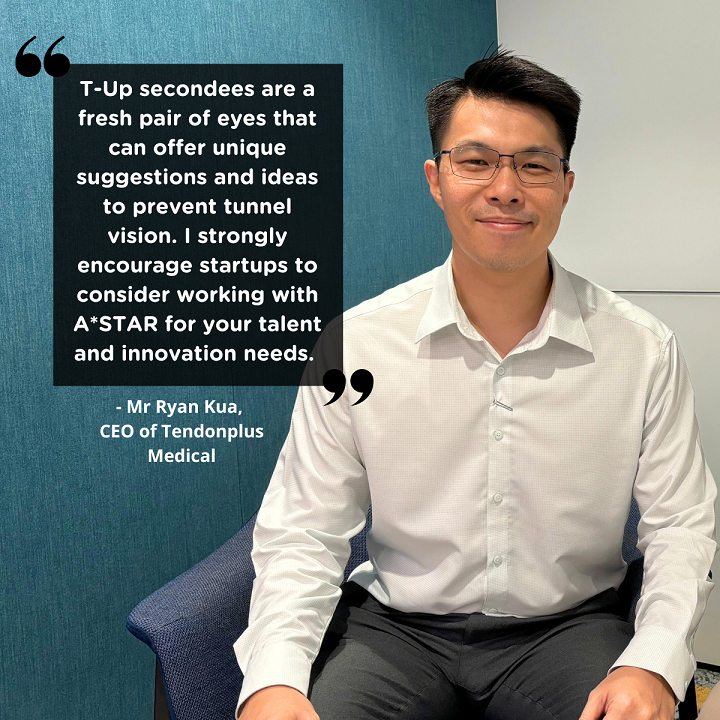
Q: What was the main challenge that your company faced and how did A*STAR’s Technology for Enterprise Capability Upgrading (T-Up) programme address that?
A: We needed to explore ideas and make improvements to the design iteration process. It was challenging to develop something novel without testing the prototype and the feasibility of its design.
Through the T-Up project, our secondee - Wu Zi An from A*STAR's Singapore Institute of Manufacturing Technology (SIMTech), was able to offer insights from a mechanical engineering perspective, which was a different expertise that was complementary to what we already had in-house. Zi An helped to improvise the testing feature of the prototype, refine the implant, and also explored the use of different types of materials.
I would say Zi An was independent, resourceful, innovative and knew how to achieve objectives by simplifying the process. He either 3D-printed or used items already available in the office to stress-test the prototype. Zi An also helped with cadaver trials, and designed a fixture to mount the arm for testing of the prototype. Overall, Zi An helped significantly in enhancing the existing design of our next-generation implant and applicator to reduce retear rates.
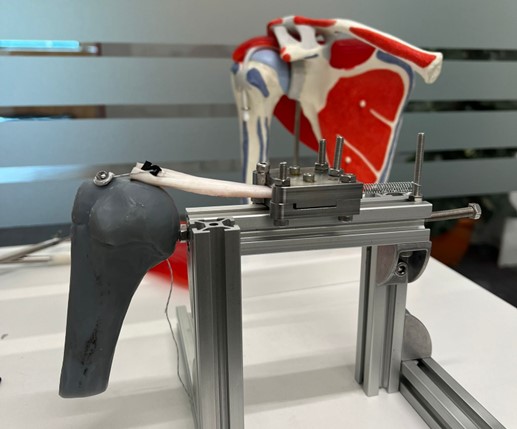
In-house test fixture for mobility testing
Q: How did the T-Up secondee (Zi An) contribute directly to your company’s increase in revenue/products?
A: As our product has not been introduced to the market yet, there is no direct impact to revenue as of now, but I would say Zi An has drastically helped to simplify the design iteration process, which certainly helps reduce time to market. As a startup, it is critical for us to validate products at a faster rate.
Currently, the total addressable market for rotator cuff repair is estimated at approximately $1.2 billion, with failed repairs costing the healthcare system $400 million annually. We estimate that the TendonPlus implant will be applicable to 70% of all rotator cuff repairs, and establish a new market segment in rotator cuff repair. Beyond Singapore, after receiving US regulatory approvals, we plan to expand into other major markets like China, the EU, ASEAN, Japan, and Korea using the same market trial data.
Q: Would you consider working with A*STAR again through the T-Up programme?
A: Yes! We are looking to expand, and will certainly consider working with A*STAR again to develop a second-generation implant.
Q: What would you say to other local startups in Singapore looking to innovate and access talent?
A: For startups, there are many different aspects to product development, particularly for hardware. You need an engineer and a mechanical engineer, and if the product is meant for patients, you might even need some biomedical expertise.
A*STAR’s T-Up programme can fill the gap for talent and expertise required for specific projects. Sometimes, as startups, we are just figuring things out. Having a T-Up engineer seconded over is a fresh pair of eyes that can offer unique suggestions and ideas to prevent tunnel vision. It feels very refreshing and I strongly encourage startups to consider working with A*STAR for your talent and innovation needs.
1 Source: Pinnacle Orthopaedic Group
Was the article helpful?
A*STAR celebrates International Women's Day

From groundbreaking discoveries to cutting-edge research, our researchers are empowering the next generation of female science, technology, engineering and mathematics (STEM) leaders.
Get inspired by our #WomeninSTEM

